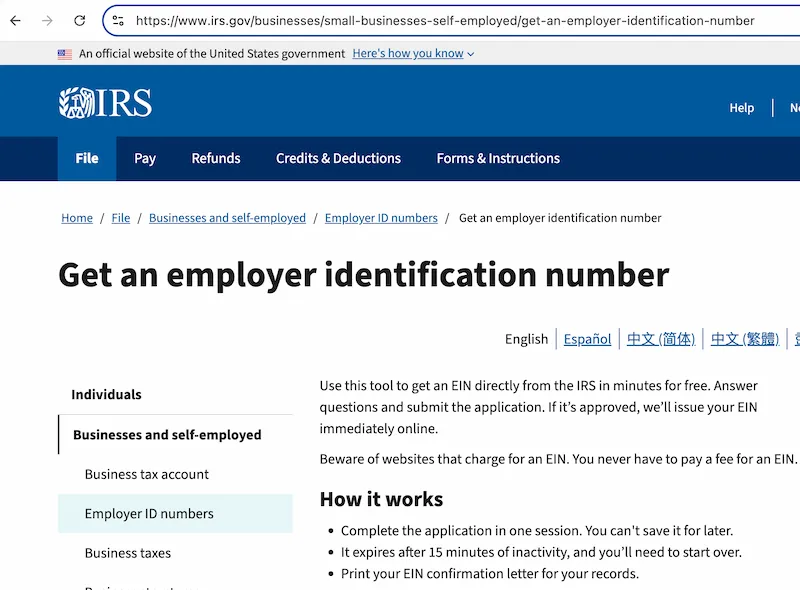How to Start a Food Truck Business in Charlotte, NC
Learn how to start a food truck business in Charlotte, NC with this step wise guide. Covers licenses, permits, equipment, staffing, and where to buy your truck.
Tauseeq Magsi
loading...

Charlotte, NC has strict ordinances regarding food trucks, but our guide will step you through the process of getting your Charlotte food truck business up and running.
Why Charlotte, NC Can Be a Profitable but Regulated Market for Food Trucks
Step‑by‑Step Launch Checklist for Food Truck Charlotte NC
Step 1: Write Your Business Plan and Concept
Step 2: Decide Your Business Structure and Register
Step 3: Apply for City & County Business License
Step 4: Health Department Permits and Inspections
Step 5: Food Seller's Permit (Sales Tax License)
Step 7: Secure Zoning and Location Permits
Step 8: Buy or Rent a Food Truck (Focus on Charlotte Listings)
Step 9: Set Up Startup Funding or Small Business Loans to Launch
Step 10: Purchase the Right Insurance Coverage for Truck and Crew
Decide Your Ideal Crew Size and Staffing Schedule
Set Up Waste Water and Power Systems for Daily Operations
Charlotte’s food truck scene is growing fast but launching a fully permitted, profitable truck isn’t as easy as just buying a fryer and hitting the streets.
The city has strict zoning rules, permit layers, and health inspections you can’t skip. At the same time, the demand is there. Breweries, office parks, festivals, and neighborhoods across the city are welcoming new Charlotte food trucks, especially ones that operate by the book.
If you're planning to join the market, timing and paperwork matter.
From finding the right food truck for sale Charlotte NC to securing spots to park, there’s a clear order to follow. You'll need licenses from the city, permits from the county, and a solid plan for everything from staffing to trash disposal.
This guide breaks down every step you need to take to launch your food truck Charlotte business the right way. We’ve included the latest costs, where to file, and what to expect so you can launch without delays or confusion.
If you're serious about joining the world of food trucks Charlotte NC, this is where it starts.
Why Charlotte, NC Can Be a Profitable but Regulated Market for Charlotte Food Trucks (top)
Food truck permits in Charlotte jumped by 34% in 2020, showing strong demand even during the pandemic. That growth hasn’t slowed down, especially in busy neighborhoods like South End, NoDa, and Uptown where foot traffic keeps trucks busy day and night.
But with the boom came a downside. Reports show more unpermitted street vendors popping up after dark, leading to health complaints and pushing legitimate food trucks Charlotte NC to compete with illegal sellers.
City and county offices acknowledge the process to launch legally isn’t fast. Permits, zoning, fire safety checks, and inspections can slow things down. Charlotte ranks among the more difficult North Carolina cities for small business setup,
Still, for those willing to follow the process, the demand is real and legal vendors tend to build longer-lasting trust and repeat customers.
If you're serious about making it in the Charlotte food trucks space, taking the right steps from the start gives you a major advantage.
Step‑by‑Step Launch Checklist for Food Truck Charlotte NC (top)
Starting a food truck Charlotte NC business takes more than great food. You need paperwork, planning, and patience. Each step has its own timeline, costs, and requirements, so skipping ahead can slow you down later.
This checklist walks you through everything in order—from setting up your business to making your first sale.
Follow each step, and you'll be ready to launch legally, confidently, and without costly delays.
Step 1: Write Your Business Plan & Concept (2–4 weeks) (top)
Before you spend a dollar, map out your vision on paper. A clear plan helps avoid costly mistakes and makes it easier to secure funding or partnerships.
✅ Define your menu, pricing strategy, and target customers
✅ Set your daily sales goals and weekly work schedule
✅ Estimate startup costs: Truck purchase or rental , remodeling, kitchen equipment , permits and licenses, insurance, ingredients, and supplies
✅ Draft a basic budget with projected income and expenses
✅ Calculate when you'll break even
✅ Planning to launch in 90 days? Start mapping things out TODAY!
Step 2: Decide Your Business Structure & Register (1–2 weeks) (top)
Before applying for licenses, you need to choose a legal business structure:
✅ Sole Proprietor — simple and low-cost, but no liability protection
✅ LLC (Limited Liability Company) — protects personal assets, flexible taxes. This is most common for food trucks
✅ Corporation — formal structure, better for investors and multiple owners
✅ Sole Proprietor: The simplest form, where you and the business are the same legally.
✅ Limited Liability Company (LLC): A separate legal entity that protects your personal assets.
✅ Corporation: A more complex structure, taxed separately from its owners.
Then follow these steps:
✅ Apply for an EIN (Employer Identification Number) — It is required for taxes and permits. Apply free at the IRS website

✅ Register your business name and structure with the state — Visit North Carolina Secretary of State – Start a Business
✅ Get business insurance and request a Certificate of Insurance (COI). — This is required for most permits in Charlotte and Mecklenburg County. Shop around or use brokers like CoverWallet .
You'll need your EIN, registration confirmation, and COI when applying for your food truck permits.
Step 3: Apply for City / County Business License (top)
Once you've established your business entity and secured insurance, your next step is to apply for a local business license, often referred to as a Privilege License or Tax Certificate.
This license is required to operate any kind of food service business including food trucks in Charlotte or Mecklenburg County.
The process is relatively simple but must be completed before you begin selling to customers. Licensing is managed through the Mecklenburg County Code Enforcement Office, which determines your eligibility and fees based on your estimated annual gross income and business type.
Typical fees for food truck businesses can vary depending on your offerings, location, and estimated sales. In most cases, your license must be renewed every year to remain in good standing.
Apply online via Mecklenburg County Code Enforcement small business licenses section
Section Summary: Apply for a local business license through Mecklenburg County Code Enforcement.
Approximate Time Required: 1–2 weeks
Step 4: Health Department Permits & Inspections (3–6 weeks) (top)
Operating food trucks in Charlotte, North Carolina requires compliance with strict food safety regulations managed by the Mecklenburg County Environmental Health Department.
This department oversees all inspections and sanitation permitting through the Food & Facilities Sanitation Program (F&FS).
You will need to apply for a Mobile Food Unit / Mobile Food Facility Permit, which confirms your food truck meets all food handling and safety standards. The current cost is approximately $150 per year, and inspections are required both before opening and periodically during the year.
If your food truck prepares or handles high-risk items, such as meat, dairy, or eggs, you may also need to obtain a Public Health Risk Permit. These permits help the county track operations that may need additional oversight.
Before getting approved, you must submit your truck’s kitchen layout and your commissary kitchen plans for review. Commissaries are required in North Carolina and your food truck must connect with a fixed-location, commercial-grade kitchen for storage and prep.
You’ll attend a plan review appointment at 3205 Freedom Drive, and you need to book your time by calling 980‑314‑1620.
Step 5: Food Seller’s Permit (Sales Tax License) (1–2 days) (top)
All food trucks in North Carolina must collect and remit state sales tax on qualifying food and drink items. To do this legally, your business must obtain a Sales and Use Tax Certificate of Registration, commonly referred to as a Food Seller’s Permit.
This is handled through the North Carolina Department of Revenue (NCDOR). You’ll complete Form NC-BR (Business Registration Application), which allows you to report and pay your food truck’s sales tax on a regular basis usually monthly or quarterly.
There’s no application fee to register, and most businesses receive their certificate within one or two business days if submitted online. NCDOR may request a small security deposit for businesses that expect high volume sales.
Keep this document with your truck as you may be required to show it during inspections or permit renewals.
Step 6: Food Handler Permit (Within first 30 days) (top)
Every employee working on your food truck including owners who prepare or serve food must obtain a Food Handler Permit within 30 days of being hired or beginning work. These certificates confirm that staff understand and follow food safety procedures such as proper handwashing, cooking temperatures, and food storage.
The State of North Carolina accepts food handler cards from a variety of approved providers, including ServSafe, eFoodHandler, and Learn2Serve. Prices vary by provider, but most cost around $10 to $15 per person and take just 2–3 hours to complete online.
Once certified, each employee should keep a printed or digital copy of their food handler card on-site. The Mecklenburg County Health Department may request proof during routine or surprise inspections.
Step 7: Secure Zoning & Location Permits (2–4 weeks) (top)
Location matters for food trucks in Charlotte, North Carolina. To park and serve food legally, you must ensure that your setup complies with local zoning regulations .
If you plan to operate on private property, the property owner is required to apply for a Zoning Use Permit through the City of Charlotte’s Code Enforcement Division.
This permit costs $175 per property per year, and must be renewed annually. You cannot legally operate without it — even if the landowner has given you permission verbally. You’ll need this for mall parking lots, breweries, or any privately owned space that allows public sales.
For public locations like Uptown, South End, or West End, vendors must apply for the Tryon Street Vendor Program . This is managed through a partnership between Charlotte Center City Partners and the city’s CDOT (Charlotte Department of Transportation). You’ll also need a Temporary Infrastructure Permit for these areas.
These programs have competitive application processes and limited space but provide access to high-traffic areas. Permits usually cost around $175 annually, but fees vary depending on event type and duration.
Step 8: Buy or Rent a Food Truck (Focus on Charlotte Listings) (top)
When you're ready to hit the road, finding the right truck is your next big step.
Search online for food truck for sale Charlotte NC or used food trucks for sale Charlotte NC to explore options. You can find listings on Facebook Marketplace, Craigslist, Roaming Hunger, and even CharlotteFoodTrucks.org.
Here’s what to consider:
✅ Used vs. New:
Used trucks are more affordable (starting around $30,000) but may need remodeling. New custom-built trucks can cost $75,000to$150,000 depending on equipment and layout.
✅ Build-Out Requirements:
Trucks must be equipped with plumbing, electricity, ventilation, and commercial-grade kitchen equipment. All plans must be reviewed and approved by Mecklenburg County before build-out.
✅ Timeline:
Between purchase, design, plan review, and final inspection, expect this step to take anywhere from 3 to 8 weeks.
Step 9: Set Up Startup Funding or Small Business Loans to Launch (top)
Startup costs for food trucks in Charlotte North Carolina can easily exceed $100,000 including equipment, licenses, inventory, and marketing. That’s where small business funding helps.
Funding options include:
✅ SBA Loans: Look into 7(a) loans or Microloans via local SBA-affiliated banks or online lenders.
✅ Local Grants & Community Funds: Check with organizations like Charlotte Center City Partners or Foundation For The Carolinas for grants and minority entrepreneur programs.
✅ Personal Savings or Friends & Family Funding: Ensure all investments are clearly documented.
✅ Investor Support: If seeking investors, present a solid business plan with cash flow projections.
Step 10: Purchase the Right Insurance Coverage for Truck and Crew (top)
You must carry insurance before your food truck can legally operate in Charlotte.
Types of insurance you’ll need:
✅ Commercial Auto Insurance: Covers accidents involving the truck.
✅ General Liability Insurance: Protects against injuries or customer claims.
✅ Workers' Comp: Mandatory if you have employees.
✅ Property Insurance: Protects your equipment from theft or damage.
You’ll also need to submit a Certificate of Insurance (as described in step 2) to Mecklenburg County during your license and health department application.
Decide Your Ideal Crew Size and Staffing Schedule (top)
Staffing depends on your menu and service volume.
Typical food truck crew:
✅ Minimum of 2 staff: One to cook, one to handle orders and payments.
✅ Busy Trucks: Consider a 3rd staff member for prep, dishwashing, or rush-hour help.
✅ Schedule shifts: base scheduling on your peak hours such as lunchtime, evening events, and weekend festivals.
Be sure to train staff on ServSafe practices and customer service. All team members need a North Carolina Food Handler Card within 30 days of employment.
Set Up Waste, Water, and Power Systems for Daily Operations (top)
Every food truck in Charlotte, North Carolina must have working systems for water, waste, and power. These are required for daily operations and are key parts of your health inspection.
You’ll need both a fresh water and gray water tank on board. Commissary kitchens often help with refills and drainage, so confirm what's included. For trash and grease disposal, check if your commissary or parking location offers services or be ready to manage your own.
Most trucks use generators for power, but some spots offer electrical hook-ups. Always plan ahead and keep extra fuel on hand to avoid outages during service.
Proper setup ensures smooth operations and avoids inspection delays.
Add Optional Seating to Create a Better Customer Experience (top)
While not required, a seating area makes a difference—especially if you’re stationed near parks, breweries, or office buildings.
If adding seating:
✅ Bring foldable tables and chairs.
✅ Don’t block walkways or your truck’s service window.
✅ Keep the setup simple so it can be packed away quickly after service.
For food trucks in Charlotte North Carolina, adding seating boosts the customer experience, especially in suburban or open-lot areas.
Final Thoughts (top)
Charlotte, NC offers a lively and growing market for Charlotte food trucks and food trucks in Charlotte North Carolina.
With strong local demand and plenty of business opportunities, it’s a great place to get started.
Finish each step discussed above methodically. Whether you're buying new or exploring used food trucks for sale in Charlotte NC, plan carefully. If you're on a budget, searching for food trucks for sale Charlotte NC can save both time and money.
Allow 3–6 months from zero to open, with quicker options if you move fast and get permits lined up.
Launching right means avoiding closure and building a strong, positive reputation in the local food truck scene.

We ❤️ Charlotte, NC!
©2025 Cocina Digital Hospitality Group, Inc. All rights reserved.
No part of this publication may be reproduced, stored in a retrieval system, or transmitted in any form or by any means, electronic, mechanical, photocopying, recording, or otherwise, without the prior written permission of the publisher.
We use cookies to enable you to use our site, understand how you use our site, and improve your overall experience.
Cookies allow us to personalize content, track which pages are most popular and least popular, and provide advertising that may be relevant to you.
Please note that cookies that are essential to the proper functioning of the site are required and cannot be disabled.
They are usually only set in response to actions made by you which amount to remembering your settings, a request for services, such as setting your privacy preferences, logging in, or filling in forms.
As such, they are the only cookies that are enabled by default.
You can set your browser to block or alert you about these cookies.
By continuing to use our site, you accept our use of cookies.